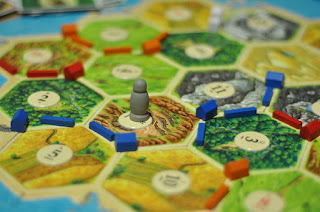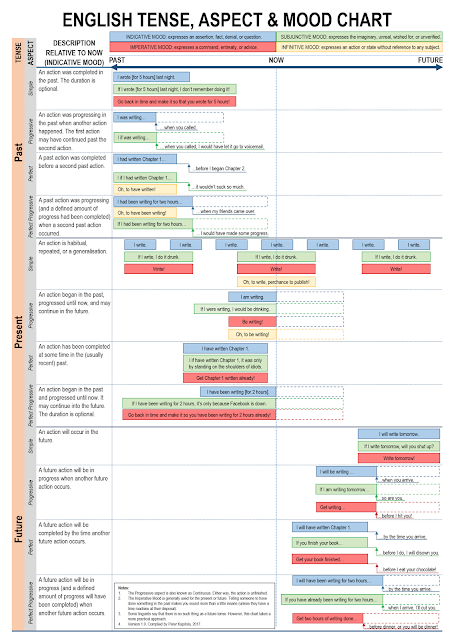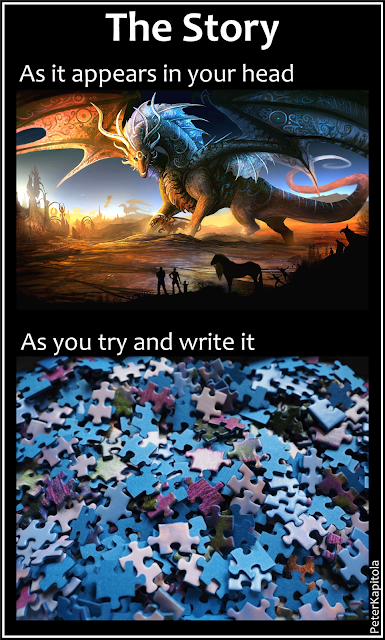Plot Help: Stories as Board Games
As someone who loves board games, I don't know why this hasn't occurred to me earlier. But if you're struggling to pull a plot together, it might be helpful to think of your story as a board game.
Sure, it might be an unusual board game. The players might start and finish at different times and have wildly different moves, resources, motivations and goals. But as long as those goals are in conflict (which is essential to a story) then your characters are basically all playing a game.
Start with Turn 1, Player 1. Become that player. What do you want? What moves are you going to make towards that? Then, become Player 2. What moves will they make? Are they aware of the other players yet? Repeat this for all players. Then move on to Turn 2. Which players are now aware of other players? Which players will have to adapt their moves based on what the other players have done? Which players are working together or against each other? Are any new players joining the game, or have some left? Keep going until the game is finished.
Just like in baking, any spices that you have added will need to be well-mixed into the story. Without mixing, the spices will stay in one clump. When the reader bites into it, they'll gag. Work your changes through the story with your wooden spoon - this is your foreshadowing.
You might also realise that some players aren't actually doing much during some parts of the game. That's fine - just give them fewer scenes during these periods. But don't let us forget about them.
Finally, do you know the rules of the game? It's your game after all. Make sure you understand them thoroughly, otherwise you'll end up with plot holes. But you don't need to explain them all to your readers (especially not all once), just enough for them to understand the game as it is played out.
Sure, it might be an unusual board game. The players might start and finish at different times and have wildly different moves, resources, motivations and goals. But as long as those goals are in conflict (which is essential to a story) then your characters are basically all playing a game.
Start with Turn 1, Player 1. Become that player. What do you want? What moves are you going to make towards that? Then, become Player 2. What moves will they make? Are they aware of the other players yet? Repeat this for all players. Then move on to Turn 2. Which players are now aware of other players? Which players will have to adapt their moves based on what the other players have done? Which players are working together or against each other? Are any new players joining the game, or have some left? Keep going until the game is finished.
Spice it up
Now, look at your story. Is it a good one? Possibly. But it will probably need some changes. Here are some ideas on how to spice up your game. (Yes, we are changing metaphors, unless you happen to be playing Bake the Cake!)- Add another player. Some games just aren't that interesting with the minimum number of players. Perhaps you need another player or two to create some interesting dynamics.
- Get some of the players drunk. Drunk people are much more risk-happy, so playing board games with them (or as them) can be rather amusing. But really, they don't have to be drunk. They just need to be willing to do silly, foolish, risky, brash or extreme things. You need some characters like this, or it'll be hard to create a good story. Sensible people are great to be around in real life, because they don't create much drama. But you don't want your story to be full of sensible people, because they don't create much drama.
- Curse those dice. Some board games, such as Chess and Go, are pure strategy. They don't rely on chance at all. But of course, life doesn't work like this. Sometimes you will land on your opponent's hotel 5 times in a freaking row. The best laid plans etc. etc. Even if your world view leads you to say "in my experience there's no such thing as luck", there are some things that even the chess-master characters can't control. Sometimes you need something unexpected to happen to shake things up a bit. But be careful with this one. Stories should be realistic, but also satisfying. A story where the hero dies at the end because of an unexpected engine failure is no fun to read.
- Change the rules. Or at least include a rule that only applies in a certain situation. Or a rule that only a few people know about. Or have someone remember what the real objective is. This can sometimes be what you need to turn the game around and snatch victory from the slobbering jaws of defeat. But again, be very careful with this one. Done badly, it can feel very cheap and unsatisfying.
Half baked
Now we have all the ingredients, let's bake that cake. (Yes, we're apparently doing board games and baking today).
You might also realise that some players aren't actually doing much during some parts of the game. That's fine - just give them fewer scenes during these periods. But don't let us forget about them.
Finally, do you know the rules of the game? It's your game after all. Make sure you understand them thoroughly, otherwise you'll end up with plot holes. But you don't need to explain them all to your readers (especially not all once), just enough for them to understand the game as it is played out.
Yes, you too can win a thing
It might seem like this only applies to the appropriately titled Game of Thrones, and other such stories with multiple factions and all sorts of schemes and plans. But when you think about it, it really does apply to even the simplest story. Each character makes moves to further their goals. And your story will be much more convincing if you think about each character's motivations at each step, rather than just leading them along through your preconceived plot.
Happy gaming, and all the best!
Happy gaming, and all the best!



Comments
Post a Comment